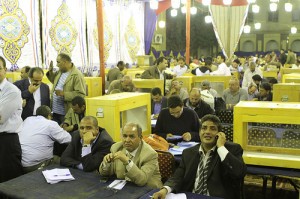Political Briefing: Egypt’s Constitutional Amendments
Posted on: April 27, 2012, by : Editor On Saturday, March 19 Egyptians will go to the polls for the first time since the revolution to vote on a series of proposed amendments to the country’s constitution. First presented on February 26, the amendments were drafted by a committee, headed by Tarek El-Beshri, that was appointed by the Supreme Military Council. Egypt’s constitution has been suspended since February 14, three days after Hosni Mubarak left office.
On Saturday, March 19 Egyptians will go to the polls for the first time since the revolution to vote on a series of proposed amendments to the country’s constitution. First presented on February 26, the amendments were drafted by a committee, headed by Tarek El-Beshri, that was appointed by the Supreme Military Council. Egypt’s constitution has been suspended since February 14, three days after Hosni Mubarak left office.
The timing of the referendum is controversial, and reflects the differing political agendas of parties involved. The Supreme Military Council needs reforms to move at a fast pace to meet its self-imposed deadline of handing over power to civilian leaders within six months. Remnants of the NDP and members of the Muslim Brotherhood support the early date because it will enable them to take advantage of their existing political organization around the country.
On the other hand, many presidential hopefuls, including Arab League Secretary-General Amr Moussa and former IAEA head Mohammed El-Baradei, have come out in opposition to the amendments, arguing either that the full constitution must be re-written or that Egypt should revert to the 1923 constitution before parliamentary and presidential elections can proceed. Many opposition members argue that the reforms do not go far enough, and that the quick referendum does not give them enough time to develop an organized national political movement.
The following is Karama’s summary of the proposed constitutional changes:
Article 76: Presidential Candidates
Before the proposed amendment: Only a handful of candidates from Mubarak’s National Democratic Party and other small parties with little weight could stand in presidential elections. In theory, independents could also stand, but would need endorsements from 250 elected officials, including 65 members of the People’s Assembly.
After the proposed amendment: Presidential candidates must either secure the support of 30 elected members from the People’s Assembly and the Shura Council; or the backing of 30,000 eligible voters from at least 15 governorates with at least 1,000 votes from each governorate; or they must be members of a registered political party and be nominated by that party with at least one member elected to either the upper or lower house of parliament.
Article 76: Term Limits for the President
Before the proposed amendment: The previous constitution allowed the president to seek re-election indefinitely.
After the proposed amendment: The draft shortens the president’s term to four years and imposes a two-term limit.
Article 88: The Conduct of Elections
Before the proposed amendment: An appointed election committee that includes judges and public figures supervises the election.
After the proposed amendment: Elections proceed under full judicial oversight, a provision that was eliminated from the constitution in 2007. The opposition had long called for a restoration of judicial supervision to deter election rigging, a practice widespread for decades.
Article 93: Court Ruling on Rigged Votes
Before the proposed amendment: The previous constitutional article said that only parliament can rule on the eligibility of people to serve in the People’s Assembly and Shura Council. The NDP majority has used this to ignore court rulings invalidating the election of some parliamentarians.
After the proposed amendment: The Supreme Constitutional Court has the jurisdiction to rule on the eligibility and validity of deputies’ membership in the People’s Assembly and the Shura Council.
Article 139: Appointment of Vice President
Before the proposed amendment: The president may appoint one or more vice-presidents, define their jurisdiction and relieve them of their posts. The rules relating to the calling to account of the president shall be applicable to the vice-president(s).
After the proposed amendment: The president must appoint a vice-president within 60 days from taking office. If the post of vice-presidency is empty, the president is obliged to appoint another deputy immediately.
Article 148: Emergency Laws
Before the proposed amendment: The president can impose a state of emergency but it has to be approved by the parliament.
After the proposed amendment: The president must present the announcement of a state of emergency to parliament within seven days. It must then be approved by a majority. The state of emergency should not last for more than six months, after which it cannot be extended without the approval of the people through a referendum.
Before the proposed amendment: The president has the right to transfer any case concerning “terror” to any judicial body, which gives him the right to use military courts.
After the proposed amendment: The draft proposes the cancellation of this article.
Article 189: Amending the Constitution
Before the proposed amendment: The President can ask parliament to approve a constitutional amendment or parliament can propose its own amendments. All amendments must be approved in a referendum.
After the proposed amendment: The elected People’s Assembly and Shura Council are required to choose a constituent assembly of 100 members to draft a new constitution for Egypt within 6 months of the election of the two chambers. The proposed change also adds that the president has the right to request a new constitution after cabinet approval, but also gives the same right to parliament if half the members of the lower and upper chambers request it. In both cases, the new constitution must be approved in a referendum.
Photograph courtesy of Sarah Carr under a Creative Commons License
Image courtesy of Sarah Carr under a Creative Commons license.
